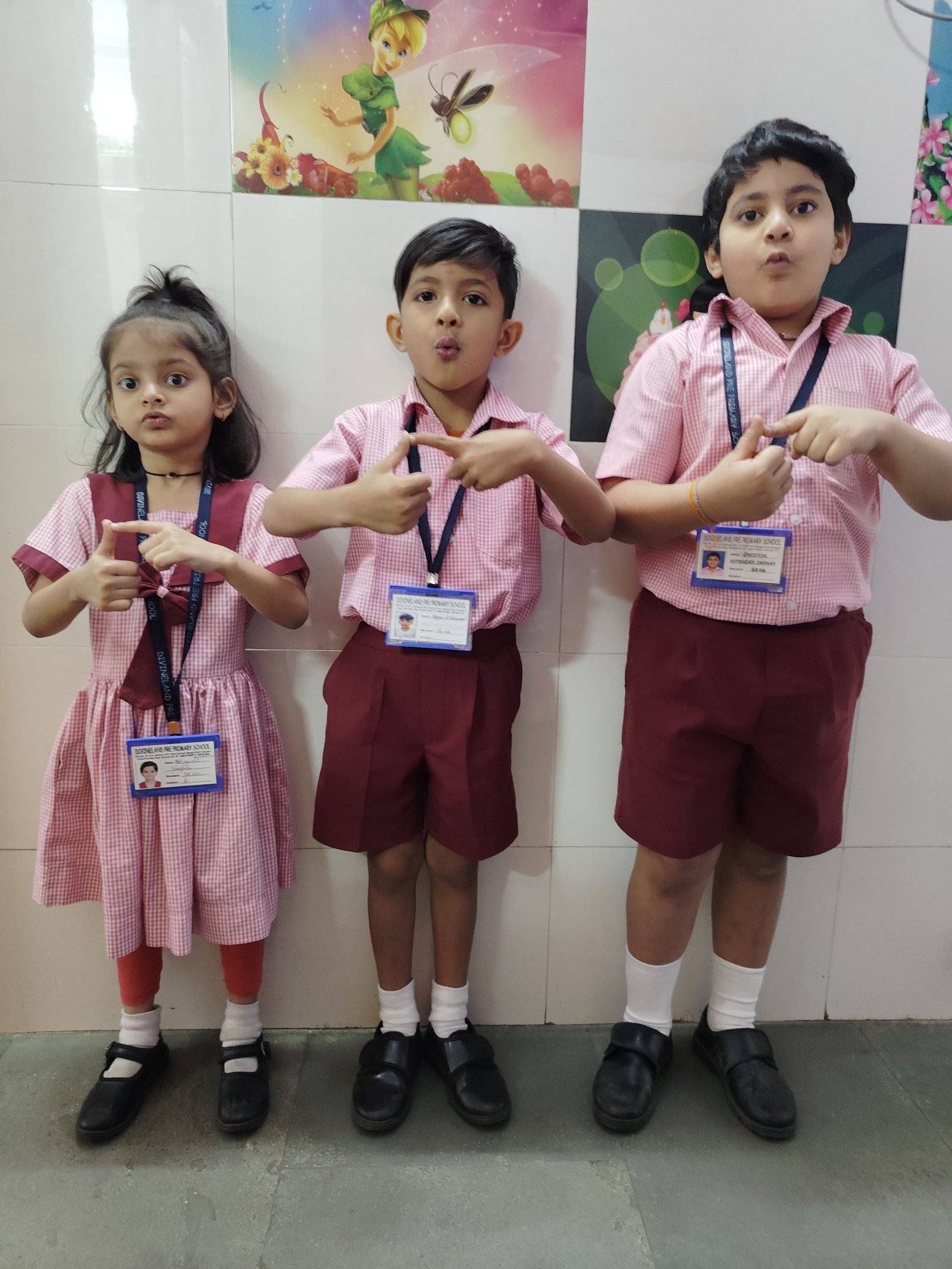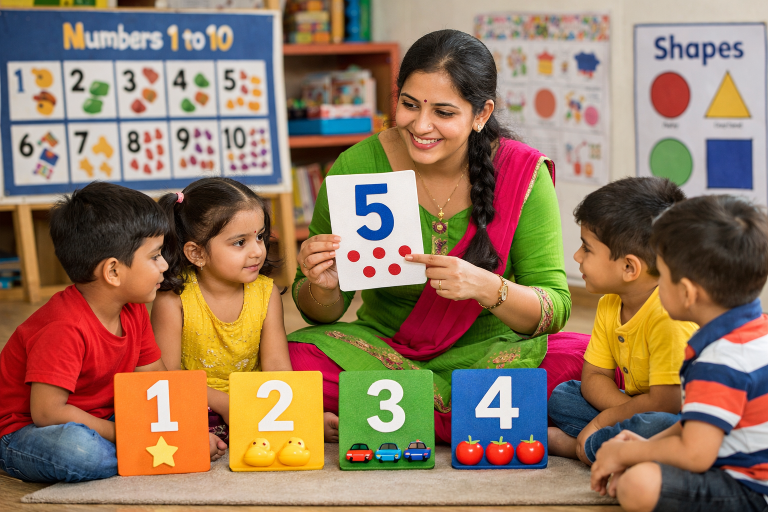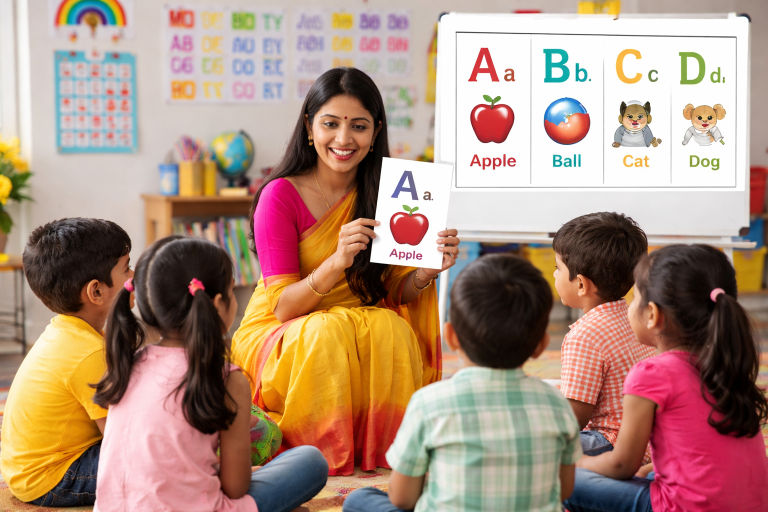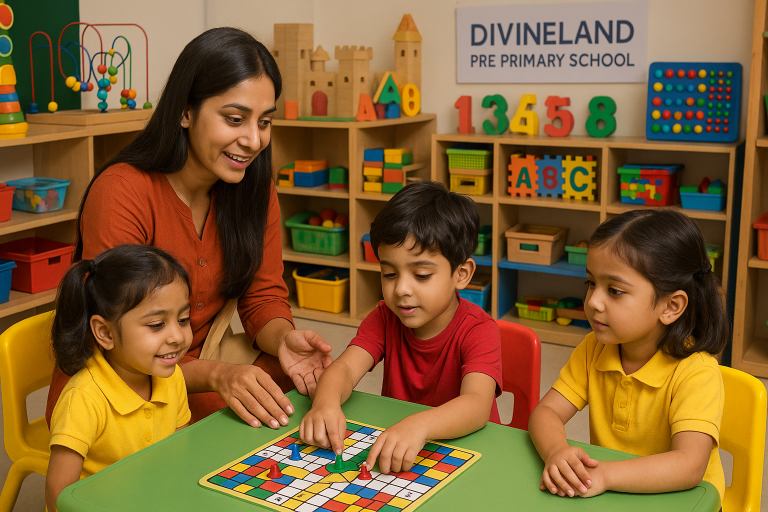
Phonics Basics teach young children to recognize the sounds letters make, which is the beginning of learning to read. For preschool children, learning sounds in a playful and easy way lays a strong foundation for writing and reading.
This blog will explore into Phonics Basics in a straightforward way, ideal for small learners and their parents. Understanding Phonics Basics clearly, children can start to associate letters with sounds and words, and early learning becomes enjoyable and significant.
For more information, call or Whatsapp on +918591021373 / +919082778593.
Click Here, to download the brochure!
What is Phonics?
Phonics is a teaching method which includes the connection between letters (graphemes) and the sounds (phonemes) they symbolize. This helps children to decode words by sounding out the words, a necessary skill for reading. Phonics Basics is set to make preschoolers understand that letters represent sounds and by merging these sounds together, one is able to produce words. Such initial understanding lays the groundwork for reading fluency, proper spelling, and the acquisition of words.
For instance, once a child learns that the letter “B” sounds out the /b/, they can start to combine that sound with other sounds, like /a/ and /t/, to be able to read the word “bat.” Being able to Master Phonics Basics provides children with the skills they need to conquer new words on their own and with confidence.
Why are Phonics Basics Important for Preschoolers?
Preschool years are a golden window of opportunity for learning language. At this age, children’s brains are growing at a fast rate, and they are naturally interested in the world around them, including the words they hear and see.
Teaching Phonics Basics at this age enhances several areas of development:
- Letter and Sound Identification: Children start to recognize letters and link them to their sounds.
- Word Construction: They begin to merge sounds to read and construct simple words.
- Listening Skill: Phonics exercises engage children in listening to the sound of words.
- Expansion of Vocabulary: As they decipher more and more words, vocabulary automatically gets boosted.
- Readiness for Reading: Acquaintance with Phonics Essentials readies children to face reading more confidently once they are at school.
For more information, call or Whatsapp on +918591021373 / +919082778593.
Click Here, to download the brochure!
Key Concepts in Phonics Basics
Instructing Phonics Basics to preschool children means presenting various core concepts at a slow, steady, and fun pace. Each concept depends on the previous one, building a systematic approach to reading success.
Letter-Sound Recognition
Begin by introducing one letter and one sound at a time. Use visual aids and repetitive orals to make them remember. Demonstrate the letter “S” and say, “S sounds like /s/ in the word snake.”
Blending Sounds
Educate children to Blend Individual Letter Sounds to create words. Example: /c/ /a/ /t/ sounds like “cat.” It helps them comprehend how words are created.
Segmenting Words
Separate words into their separate sounds. This is the opposite of blending and supports spelling. Practice: Ask the child to name the sounds in “dog.” They may respond /d/ /o/ /g/.
Phonemic Awareness
Assist children in noting and playing with the separate sounds in spoken words, even when there are no written letters. Actions such as clapping syllables or identifying beginning sounds are excellent at developing this skill.
Fun Ways to Teach Phonics Basics
Learning Phonics Basics does not necessarily have to be work. In fact, the more enjoyable it is, the better the children learn the facts.
Here are some interactive ways to incorporate phonics into daily activities:
- Alphabet Songs: Sing upbeat songs that accentuate the sound each letter produces, and not necessarily the name of the letter.
- Sound Hunts: Scavenger hunt to gather items that begin with a certain letter sound. Example: /b/ sound, gather a ball, banana, or book.
- Twist to Story Time: Read aloud from books and interrupt to identify words that start with a letter sound you are currently practicing.
- Interactive Games: Flashcards, apps, or printable works with matching tasks or sound puzzle activities.
- Letter Crafts: Create letter shapes with playdough or draw pictures of objects that begin with a particular sound.
Tips for Parents and Teachers
You don’t have to be a Reading Specialist to help your child learn. These are some easy tips to make the most out of Phonics Basics at home or in the classroom:
- Repetition Builds Confidence: Practice sounds frequently and reward yourself when your child recalls them.
- Keep It Interactive: Get your child to say the sounds out loud, respond to questions, and pose their own.
- Praise Effort, Not Just Accuracy: Make learning rewarding by praising attempts and effort, rather than excellence.
- Use Everyday Opportunities: Mark objects at home with basic words, identify letters in signs, or play “I spy” with sounds.

Signs of Progress in Phonics Basics
As your child gains confidence with Phonics Basics, you might start to see some great changes in their behavior and abilities. These little milestones tell you that learning is taking hold:
- Letter Identification: Your child can identify letters and read the sounds.
- Sound Match: They begin to recognize which words start with which sounds.
- Word Attempts: Your child may attempt to read or write short words such as “cat,” “dog,” or “hat.”
- Interest in Language: Increasing interest in books, rhymes, and stories is a good indicator of engagement.
Introducing Phonics Basics to children at preschool age sets them on a strong path for reading and language skills. By gentle, repeated exposure through games, song, and day-to-day activities, phonics can be made an enjoyable activity for a child. As children discover the link between letters and sounds, they become not just more knowledgeable, but also more confident, which primes them to be successful as they continue along their reading journey.
For more information, call or Whatsapp on +918591021373 / +919082778593.
Click Here, to download the brochure!
Best Phonics Classes in Gorai
Searching for the Best Phonics Classes in Gorai is a priority for most parents wishing to lay solid reading foundations in their preschoolers. One of the best options locally is Divineland’s Phonics Classes, which excel through their concentrated, child-centered teaching method that makes learning effective as well as fun. The classes aim at enabling children to grasp Phonics Basics, which is the root of reading and writing.
Divineland’s Phonics Classes employ tested techniques and interactive tools to fortify this link. The program is well thought out, with the learning style of young minds in mind, and ensures that every child receives the individual attention they require.
Why Divineland Provides the Best Phonics Classes in Gorai:
- Individualized Attention: Small batch size to concentrate on each child’s development.
- Qualified Teachers: Educators trained professionally in Phonics Basics teaching.
- Interactive Materials: Utilizing stories, songs, games, and pictures to learn sounds and letters.
- Systematic Learning: Gradually moving kids from letter sounds to reading complete words in a step-by-step manner.
- Parental Support: Easy-to-follow guidelines to enable parents to follow up at home.
The value of Phonics Basics cannot be overemphasized. It is not merely a matter of identifying letters—it is a matter of really getting it, how those letters combine into words. At Divineland, each session is designed to assist children in learning these foundational skills in an anxiety-free environment.
If you want the Best Phonics Classes in Gorai, Divineland is one reliable option where your child will learn, develop, and have fun reading from scratch.
Give your child a happy beginning—enroll with Divineland’s Phonics Classes now!
For more information, call or Whatsapp on +918591021373 / +919082778593.
Click Here, to download the brochure!
Phonics Basics for Preschoolers
FAQs
What Age should My Child Start Learning Phonics?
Kids can begin learning phonics at around 3-4 years of age, when they start recognizing letters and being keenly interested in sounds and words.
How Can I Make Phonics Fun for My Preschooler?
Implement songs, games, stories, and hands-on activities such as letter crafts to make phonics fun and enjoyable daily.
Why Choose Divineland's Phonics Classes for My Child?
Divineland's Phonics Classes provide fun, instructor-led classes that teach children to identify sounds and words with confidence and enthusiasm.


